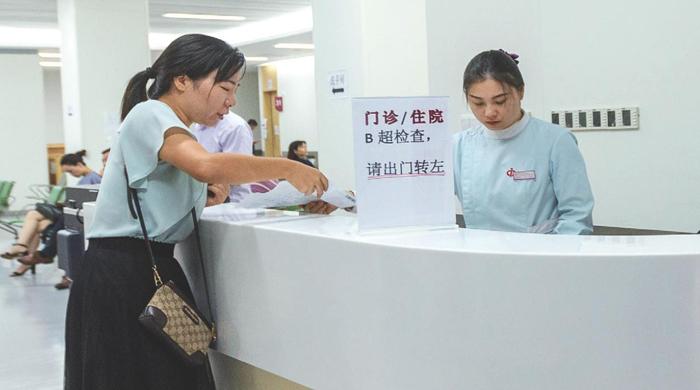The Virginity Complex
贺樱子

Chundao Zhanxue never imagined that she would spend three months looking for a hospital willing to perform a five-minute operation to remove cysts on her cervix. But when the third hospital she visited refused her without parental consent, she took to social media to vent frustration over her lack of autonomy over her body.
Chundao, who is only identified by her Weibo handle, had been turned away by five doctors who stated they could not perform the surgery because it would rupture her hymen, which is commonly believed to be a sign of lost virginity.
On Weibo, Chundao—who is a lesbian, and estranged from her parents after coming out—quoted a section of the hospitals consent form that stated, “My parents/spouse/boyfriend know the risks of the operation,” and demanded, “How can some legally unrelated person like a boyfriend make decisions over a womans body parts, while she has no say herself?”
Many users told Chundao that they had the same experience. “Many hospitals do not allow unmarried women to undergo pelvic exams because doctors assume that unmarried women have no sexual experience, and the exam may damage the hymen, so I have to check ‘married under the marital status column every time,” one wrote.
Another user, who stated she was a gynecologist, wrote that hospitals often enforce such rules to avoid conflicts between doctors and patients, citing an example of parents who demanded compensation from her hospital for their daughters ruptured hymen after they performed an exam without parental consent. An article by Journalist Association of the Communication University of Zhejiang (CUZ) found a passage in a government-authorized obstetrics and gynecology textbook that asked doctors to make decisions on whether to proceed with invasive gynecological exams based on the patients sexual history.
A growing number of Chinese are becoming more accepting of premarital sex. Renowned sexologist Li Yinhe estimated that around 71 percent of people in China had pre-marital sexual relations as of 2013, compared to just 15 percent in 1989, and the rate could be closer to 80 or 90 percent for those born after the 80s.
Feminists and doctors have been working to dispel the myth that the hymen is related to virginity, as medical studies have found that sexual activities cause no identifiable changes to the hymen for many women, and that the tissue may be ruptured during strenuous physical exercise or injury. There is no medical test that states definitively whether a woman has had sex or not.
Nevertheless, archaic attitudes toward sex and promiscuity are difficult to change. Questions on premarital sex attracted countless heated debates on Chinese question forum Zhihu, with most male-identifying users praising “pure” women and stating they would never marry women who were not virgins. Hymen repair surgery, which was introduced to China in the 1990s, continues to be available at major hospitals around the country.
Social media influencers and public health accounts have rallied to support Chundao. “Backward notions about traditional purity are being used by doctors to ‘morally kidnap [patients], making it difficult for women to obtain medical procedures,” stated the article by the Journalist Association of CUZ.
Dingxiang Yisheng, an influential e-medicine account, was more blunt. “Medically, there is no difference between the hymen and any other vaginal tissue,” it wrote on Weibo. “And moreover, having sexual experience means nothing.”
Teaching at Home
“What if I quit the parents WeChat group?” a father from Jiangsu province threatened his childs teacher in a video. “Its me who tutors [the kid] and corrects [the homework], but you I have to thank for the hard work.”
The viral video drew support from many parents simmering under increased pressure to supervise their childrens education, exacerbated by chat groups on messaging app WeChat where teachers expect parents to report their childrens progress, then comment on their level of involvement. Simply keeping up with the messages is difficult, as a mother of two in Jiangsu, part of 16 such groups, told the Yangtse Evening Post.
In response, teachers have complained about their own workload, including “helicopter” parents demands for detailed updates on their childrens education. They attribute the problem to a competitive education environment, where parents push teachers to teach more advanced subjects at a faster pace, then must tutor their children at home so they can keep up.
– Tan Yunfei (譚云飞)
Skipping Classes
Many viewers thought it was a joke when a Ms. Liu in Hangzhou, Zhejiang province, told the local TV station that she paid 1,288 RMB to enroll her son in a rope-skipping course.
However, elementary school students have been signing up to be trained in this childhood exercise since 2014, when the Ministry of Education included jump-rope into student physical fitness examinations, supposedly to promote “quality education” that emphasizes students overall development instead of academics alone. Rope-skipping results account for 20 percent of students PE grade in the first to fourth grade, and extra credit is available for skips over the maximum of 117 skips in one minute.
In spite of outrage over the exorbitant fees, many parents are positive about the development. “Instead of playing with their mobile phones, kids can get some exercise, and earn higher marks,” China News paraphrased some parents as saying. – T.Y.
Minor Protection
A spate of child abuse, molestation, and school bullying cases in recent years have led China to update the legal protection of minors. The second revision of Chinas Law on the Protection of Minors, originally enacted in 1991, will take effect on June 1, 2021.
Among the laws 132 articles, it specifies for the first time that local civil affairs departments and provincial government are responsible for ensuring the protection of minors, whereas only families, schools, “societal actors,” and legal organs had been held responsible before. Governments will be required to grant access to their criminal database so that organizations that serve minors may perform background checks on job applicants and existing staff.
The law also establishes protection for minors on the internet—setting limits on minors spending online, preventing web platforms from distributing content harmful to minors, and prohibiting cyberbullying. – T.Y.
 汉语世界(The World of Chinese)2020年6期
汉语世界(The World of Chinese)2020年6期
- 汉语世界(The World of Chinese)的其它文章
- Editor’s Letter
- the Walking Dead
- Skin Deep
- DISTRICT CHAMP铁西冠军
- Paint the Town
- rural rising
